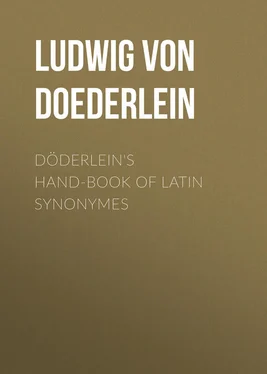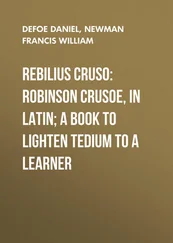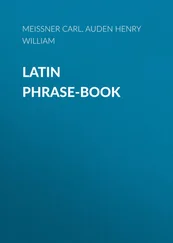Ludwig Doederlein - Döderlein's Hand-book of Latin Synonymes
Здесь есть возможность читать онлайн «Ludwig Doederlein - Döderlein's Hand-book of Latin Synonymes» — ознакомительный отрывок электронной книги совершенно бесплатно, а после прочтения отрывка купить полную версию. В некоторых случаях можно слушать аудио, скачать через торрент в формате fb2 и присутствует краткое содержание. Издательство: Иностранный паблик, Жанр: Языкознание, foreign_antique, foreign_prose, на английском языке. Описание произведения, (предисловие) а так же отзывы посетителей доступны на портале библиотеки ЛибКат.
- Название:Döderlein's Hand-book of Latin Synonymes
- Автор:
- Издательство:Иностранный паблик
- Жанр:
- Год:неизвестен
- ISBN:нет данных
- Рейтинг книги:3 / 5. Голосов: 1
-
Избранное:Добавить в избранное
- Отзывы:
-
Ваша оценка:
- 60
- 1
- 2
- 3
- 4
- 5
Döderlein's Hand-book of Latin Synonymes: краткое содержание, описание и аннотация
Предлагаем к чтению аннотацию, описание, краткое содержание или предисловие (зависит от того, что написал сам автор книги «Döderlein's Hand-book of Latin Synonymes»). Если вы не нашли необходимую информацию о книге — напишите в комментариях, мы постараемся отыскать её.
Döderlein's Hand-book of Latin Synonymes — читать онлайн ознакомительный отрывок
Ниже представлен текст книги, разбитый по страницам. Система сохранения места последней прочитанной страницы, позволяет с удобством читать онлайн бесплатно книгу «Döderlein's Hand-book of Latin Synonymes», без необходимости каждый раз заново искать на чём Вы остановились. Поставьте закладку, и сможете в любой момент перейти на страницу, на которой закончили чтение.
Интервал:
Закладка:
Contemnere, see Spernere .
Contemplari, see Considerare .
Contendere, see Dicere .
Contentio, see Disceptatio .
Contentum esse, see Satis habere .
Continentia, see Modus .
Contingere, see Accidere .
Continuo, see Repente .
Continuus; Perpetuus; Sempiternus; Æternus. 1. Continuum means that which hangs together without break or chasm; perpetuum, that which arrives at an end, without breaking off before. Suet Cæs. 76. Continuos consulatus, perpetuam dictaturam. 2. Perpetuus, sempiternus, and æternus, denote continued duration; but perpetuus, relatively, with reference to a definite end, that of life for example; sempiternus and æternus, absolutely, with reference to the end of time in general; sempiternus means, like ἀΐδιος, the everlasting, what lasts as long as time itself, and keeps pace with time; æternum (from ætas) like αἰώνιον, the eternal, that which outlasts all time, and will be measured by ages, for Tempus est pars quædam æternitatis . The sublime thought of that which is without beginning and end, lies only in æternus, not in sempiternus, for the latter word rather suggests the long duration between beginning and end, without noting that eternity has neither beginning nor end. Sempiternus involves the mathematical, æternus the metaphysical notion of eternity. Cic. Orat. ii. 40, 169. Barbarorum est in diem vivere; nostra consilia sempiternum tempus spectare debent; compare with Fin. i. 6, 17. Motum atomorum nullo a principio, sed æterno tempore intelligi convenire. (i. 1.)
Contrarius, see Varius .
Controversia, see Disceptatio .
Contubernium, see Conjugium .
Contumacia, see Pervicacia .
Contumelia; Injuria; Offensio. 1. Contumelia (from contemnere) denotes a wrong done to the honor of another; injuria, a violation of another’s right. A blow is an injuria , so far as it is the infliction of bodily harm; and a contumelia , so far as it brings on the person who receives it, the imputation of a cowardly or servile spirit. Senec. Clem. i. 10. Contumelias , quæ acerbiores principibus solent esse quam injuriæ . Pacuv. Non. Patior facile injuriam , si vacua est contumelia . Phædr. Fab. v. 3, 5. Cic. Quint. 30, 96. Verr. iii. 44. 2. Contumelia and injuria are actions, whereas offensio denotes a state, namely, the mortified feeling of the offended person, resentment, in opp. to gratia . Plin. H. N. xix. 1. Quintil. iv. 2. Plin. Pan. 18. (iv. 194.)
Conventus, see Concilium .
Convertere, see Vertere .
Convivium, see Epulæ .
Convicium, see Maledictum .
Copia, see Occasio .
Copiæ, see Exercitus .
Copiosus, see Divitiæ .
Cordatus, see Sapiens .
Corpulentus, see Pinguis .
Corpus, see Cadaver .
Corrigere; Emendare. Corrigere means to amend, after the manner of a rigid schoolmaster or disciplinarian, who would make the crooked straight, and set the wrong right; whereas emendare, after the manner of an experienced teacher, and sympathizing friend, who would make what is defective complete. Plin. Pan. 6, 2. Corrupta est disciplina castrorum, ut tu corrector emendator que contingeres; the former by strictness, the latter by wisdom. Cic. Mur. 29. Verissime dixerim, nulla in re te (Catonem) esse hujusmodi ut corrigendus potius quam leviter inflectendus viderere; comp. with Plin. Ep. i. 10. Non castigat errantes, sed emendat . (v. 319.)
Corrumpere, see Depravare .
Coruscare, see Lucere .
Coxa; Latus; Femur. Coxa and coxendix (κοχώνη) mean the hip; latus, the part between the hip and shoulder; femur and femen, the part under the hip, the thigh. (vi. 84.)
Crapula, see Ebrietas .
Crater, see Poculum .
Creare; Gignere; Parere; Generare. 1. Creare (from κύρω) means, by one’s own will and creative power to call something out of nothing; gignere (γίγνεσθαι, γενέσθαι) by procreation or parturition; gignere is allied to generare only by procreation, and to parere (πεπαρεῖν, πείρειν, only by parturition. 2. Gignere is a usual expression, which represents procreation as a physical and purely animal act, and supposes copulation, conception, and parturition; whereas generare is a select expression, which represents procreation as a sublime godlike act, and supposes only creative power; hence, for the most part, homines et belluæ gignunt , natura et dii generant . And, Corpora gignuntur , poemata generantur . Cic. N. D. iii. 16. Herculem Jupiter genuit , is a mythological notice; but Legg. i. 9. Deus hominem generavit , is a metaphysical axiom. (v. 201.)
Crebro, see Sæpe .
Credere, see Censere and Fidere .
Cremare, see Accendere .
Crepitus, see Fragor .
Crepusculum, see Mane .
Criminari, see Arguere .
Crinis; Capillus; Coma; Cæsaries; Pilus; Cirrus; Cincinnus. 1. Crinis and capillus denote the natural hair merely in a physical sense, like θρίξ; crinis (from κάρηνον), any growth of hair, in opposition to the parts on which hair does not grow; capillus (from caput), only the hair of the head, in opp. to the beard, etc. Liv. vi. 16. Suet. Aug. 23. Cels. vi. 2. Cic. Tusc. v. 20. Rull. ii. 5; whereas in coma and cæsaries the accessory notion of beauty, as an object of sense, is involved, inasmuch as hair is a natural ornament of the body, or itself the object of ornament; coma (κόμη) is especially applicable to the hair of females; cæsaries, to that of males, like ἔθειρα. Hence crinitus means nothing more than covered with hair; capillatus is used in opp. to bald-headed, Petron. 26, and the Galli are styled comati , as wearing long hair, like καρηκομόωντες. 2. Crinis, capillus, coma, cæsaries, denote the hair in a collective sense, the whole growth of hair; whereas pilus means a single hair, and especially the short and bristly hair of animals. Hence pilosus is in opp. to the beautiful smoothness of the skin, as Cic. Pis. I; whereas crinitus and capillatus are in opp. to ugly nakedness and baldness. (iii. 14.) 3. Cirrus and cincinnus denote curled hair; cirrus (κόῤῥη) is a natural, cincinnus (κίκιννος) an artificial curl. (iii. 23.)
Cruciatus; Tormentum. Cruciatus, crucimenta (κρόκα, κρέκω), denote in general any pangs, natural and artificial; tormenta (from torquere), especially pangs caused by an instrument of torture, like the rack. Cic. Phil. xi. 4. Nec vero graviora sunt carnificum tormenta quam interdum cruciamenta morborum. (vi. 87.)
Crudelitas, see Sævitia .
Cruentus, Cruor, see Sanguis .
Cubare; Jacere; Situm esse. Cubare (from κείω) denotes the lying down of living beings; situm esse (ἑτόν, εἶσαι) of lifeless things; jacere, of both. Cubare and jacere are neuter; situm esse, always passive. Further, cubare gives the image of one who is tired, who wishes to recruit his strength, in opp. to standing, as requiring exertion, whereas jacere gives the image of one who is weak, without any accessory notion, in opp. to standing, as a sign of strength. (i. 138.)
Cubiculum, see Conclave .
Cubile; Lectus. Cubile is a natural couch for men and animals, a place of rest, like κοίτη, εὐνή; lectus, an artificial couch, merely for men, a bed, like λέκτρον. (v. 279.)
Cubitus, see Ulna .
Читать дальшеИнтервал:
Закладка:
Похожие книги на «Döderlein's Hand-book of Latin Synonymes»
Представляем Вашему вниманию похожие книги на «Döderlein's Hand-book of Latin Synonymes» списком для выбора. Мы отобрали схожую по названию и смыслу литературу в надежде предоставить читателям больше вариантов отыскать новые, интересные, ещё непрочитанные произведения.
Обсуждение, отзывы о книге «Döderlein's Hand-book of Latin Synonymes» и просто собственные мнения читателей. Оставьте ваши комментарии, напишите, что Вы думаете о произведении, его смысле или главных героях. Укажите что конкретно понравилось, а что нет, и почему Вы так считаете.












